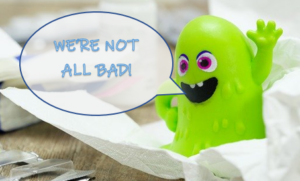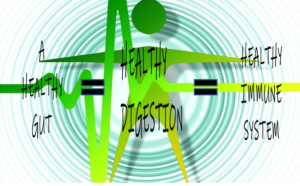We’ve all heard, “it’s important to have a healthy gut.”
But what EXACTLY does that mean?
And, maybe you have heard people talk about the “microbiome,” but wonder what in the world that is all about?!
We want to shed some light on this topic. And, to help, we sought out the expertise of Jennifer Jackson, MD, FACP. Dr. Jackson serves as the Associate Professor of Medicine and Associate Program Director of Internal Medicine of the KU School of Medicine in Wichita, KS.
What is the microbiome?
To keep it simple, your microbiome is a collection of microbes, such as bacteria, fungi, viruses, and their genes, that live on and inside our bodies. Believe it or not, there are over 10,000 microbial species in the human ecosystem and every human is “host” to 1,000 or more types of bacteria. Every one of us carries up to 5 pounds of bacteria in our bodies!
Dr. Jackson describes it as, “Humans are an ecosystem. We are living in harmony with trillions of creatures that directly and indirectly control hormonal, metabolic and physiologic processes in our bodies.”
Why has the microbiome received so much attention recently?
The microbiome only started to gain recognition in the late 1990s. Then, in 2007, the Human Microbiome Project was started. This project is focused on understanding more about how the microbiome affects human health and disease. There is tremendous progress being made in this area and we should expect to hear much more about this going forward.
Dr. Jackson describes it well: “When the human genome started, we thought it would take years to identify all the human genes. But we discovered humans are not that complex, at least not when counting the number of genes. We own less DNA than a grain of rice! But the fundamental discovery of the microbial DNA that has become a part of us is fascinating. We are just scratching the surface in understanding how our bodies interact with these creatures.”
Why is the microbiome important?
It is now becoming clearer that the makeup of our microbiome shapes our health — for better or worse. Each type of bacteria in our system plays a different role. Many of them are extremely important for good health. Other types of bacteria (sometimes called “pathogenic”) also exist in all of us. These pathogens are known to cause illness but, in healthy individuals, they can coexist peacefully without causing illness or disease.
The more diverse and balanced our microbiome is, the healthier we are likely to be. When things get out of balance, that’s when disease and illness can push their way in.
Some of the benefits of a diverse and balanced microbiome:
 Good food digestion and nutrient absorption.
Good food digestion and nutrient absorption.- Strong immune system, including the ability to respond efficiently to infection.
- Brain health resulting from chemicals these bacteria produce in your brain. Also, your bacteria affect your central nervous system, which controls brain function.
- Weight loss resulting from increased satiety.
- Good bacteria help increase insulin sensitivity, and even produce vitamins, further improving health.
When dysfunction shows up in our microbiome, a number of illnesses can develop including diabetes, arthritis, cancer, asthma, multiple sclerosis, inflammatory bowel diseases and depression — just to name a few.
Our microbiome is continually changing.
The microbiome of a mother likely affects the health of her children, and then the biomes of kids and adults evolve based on a variety of choices they make. According to Dr. Jackson, “The biome is changing all the time! We know that the biome is set up at birth. It is the beginning of our immune system and a healthy biome develops a more mature immune system. You can grow a sick and weak type of biome – even letting a few cancer cells through – by eating a diet high in processed foods, simple sugars and inflammatory fat. You can grow a healthy, thriving anti-inflammatory biome by eating whole fresh foods. There is strong evidence that you can decrease risk of disease in as little as THREE WEEKS by changing the food you eat and altering the biome.”
She shares what she has seen from her patients. “The most dramatic results I have seen come from people who are suffering from pain and/or other inflammatory conditions. By eliminating inflammatory foods and adding in whole foods, they see almost immediate life changing results. I have seen patients with rheumatoid arthritis resolve their inflammation and patients with disabling osteoarthritis become mobile and pain free despite X-rays that would cause you to cringe due to their ‘bone-on-bone’ disease.”
How do the foods we eat affect our microbiome?
Your diet plays a HUGE role in how diverse and balanced your gut microbes are. Bacteria need food, just like we need food. So, when we eat, we are also feeding the bacteria in our digestive system. The same foods that are good for us are good for our bacteria and microbiome. Of course, the same foods that are bad for us also cause problems in our microbiome.
Here are some foods that are especially good for maintaining a healthy microbiome:
 Fiber! Bacteria love fiber, especially when it comes from A WIDE VARIETY of vegetables, fruits, whole grains, beans and legumes. Unfortunately, the majority of Americans are deficient in fiber. For gut health, this is arguably one of the most beneficial ingredients.
Fiber! Bacteria love fiber, especially when it comes from A WIDE VARIETY of vegetables, fruits, whole grains, beans and legumes. Unfortunately, the majority of Americans are deficient in fiber. For gut health, this is arguably one of the most beneficial ingredients.- Prebiotics! While probiotics provide good bacteria, prebiotics help feed these good bacteria. Fiber is an example of a prebiotic. Good sources of prebiotics include greens, apples, asparagus, artichokes, mushrooms, fennel, garlic, leeks, onions, bananas and more.
- Fermented! These foods contain probiotics and provide healthy bacteria, which help to crowd out the unhealthy bacteria. Some good fermented foods include yogurt, sauerkraut, pickles, tempeh, kefir and kimchi.
 Omega-3s! Research is showing that foods rich in Omega-3s can improve diversity of bacteria in our guts. Remember, our bodies don’t produce Omega-3s, so we have to get them from our foods. Fantastic sources include salmon, grass-fed beef, walnuts, edamame, kidney beans, flax seeds and chia seeds.
Omega-3s! Research is showing that foods rich in Omega-3s can improve diversity of bacteria in our guts. Remember, our bodies don’t produce Omega-3s, so we have to get them from our foods. Fantastic sources include salmon, grass-fed beef, walnuts, edamame, kidney beans, flax seeds and chia seeds.- Polyphenols! Foods rich in polyphenols help stimulate healthy bacteria growth. Good choices include red wine, green tea, dark chocolate, berries, olive oil, whole grains and certain spices (like turmeric).
And, YES, these are all REAL foods!
What else can we do to be a good host and maintain a healthy microbiome?
Dr. Jackson recommends “FIVE PILLARS”:
- Nutrition (REAL food, mostly plants, not too much — get rid of the man-made junk)
- Physical activity (reasonable cardiac and strength training, non-sedentary lifestyle)
- Stress transformation (mindfulness, gratitude, behavior counseling if needed)
- Relationships (love, prayer, rituals)
- SLEEP!
As for probiotic supplements, they can play a role, but it’s important to take a more comprehensive approach. Dr. Jackson says, “It depends on what you are trying to do with it. Ideally, we selectively grow our microbiome by proper stress transformation, physical activity and proper nutrition including plenty of whole, non-inflammatory foods, prebiotic fiber and live culture foods that provide lots of natural probiotics. However, sometimes we need a little help and that is where a supplement might be a good idea for some people depending on the situation.”
Are you being a good host to your five pounds of bacteria?
What other questions do you have? Please let us know!
 LEARN MORE ABOUT THE NAPKIN!
LEARN MORE ABOUT THE NAPKIN!





My favorite online doctor’s mantra is ‘Protect the liver; feed the gut.’ And ‘If you don’t feed your gut, your gut will feed on you.’ Great advice but a list of WHAT we should be feeding our gut is much more practical and helpful. Thanks so much for providing that information and doing the legwork to obtain Dr Jackson’s advice. Her Five Pillars are spot on!